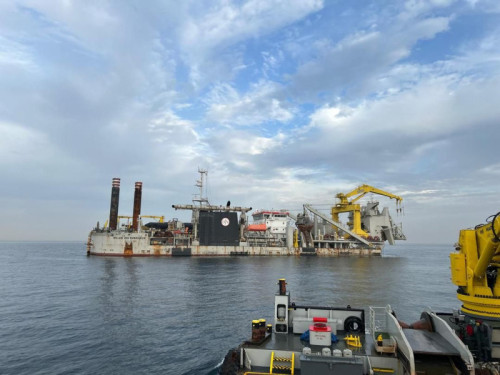
DP World announced that the arrival of the dredger Willem Van Rubroeck in Ndayane this month marks the start of maritime works for the US$1.2 billion Port of Ndayane, a project set to transform Senegal into a major centre for global trade.
The vessel will dredge a 5 km-long shipping channel — an essential step in building this state-of-the-art, high-capacity port designed to elevate Senegal’s trade infrastructure.
Phase 1 of the project includes an 840m quay and a 5km channel capable of accommodating the world’s largest container ships. The construction in this phase will create a capacity to handle 1.2 million TEUs annually. Phase 2 will add a further 410m quay, positioning Ndayane as a leading logistics hub in West Africa.
The Port of Ndayane builds on DP World’s success at the Port of Dakar, which has grown from handling 300,000 TEUs in 2008 to 800,000 TEUs in 2023. However, the Dakar port’s location within a densely urbanized area limits expansion, making Ndayane a strategic solution to support Senegal’s long-term trade and economic growth ambitions.
Following a recent meeting with Senegalese Prime Minister Ousmane Sonko, DP World Group Chairman and CEO Sultan Ahmed bin Sulayem emphasised the company’s long-term commitment to Senegal:
He said: “We believe in Senegal’s economic potential and fully support the government’s ambitions for the nation. The Port of Ndayane will elevate Senegal and impact trade across the African continent. We are proud of our achievements with the Port of Dakar, and Ndayane marks the next level—positioning Senegal as a key trade hub for the region. Our plans extend beyond the port. We will develop an economic zone near the port and Blaise Diagne International Airport, which is expected to create even more employment than the port itself.”
DP World is collaborating with British International Investment (BII), the UK’s development finance agency, to deliver the project. BII estimates the port boost Senegal’s GDP by 3% through increased trade flows, potentially adding US$15 billion in trade value by 2035. During construction, the project will create over 1,800 jobs, and once operational, it is expected to support 2.3 million jobs across Senegal, including 22,000 tied directly tied to expanded trade.
